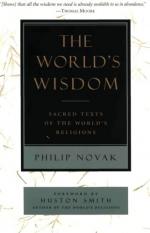|
This section contains 1,037 words (approx. 3 pages at 400 words per page) |

|
Chapter 3: Confucianism Summary and Analysis
Confucius taught that man can have a successful life when he is moral given the assumption that the cosmos itself sets the stage for moral order. Above all other religions, Confucianism has been the most influential in shaping the Chinese mind. The Confucian canon is comprised of ten titles. Confucius is credited with saving four of the first six books that already existed before he was born. These books are the Book of History, the Book of Poetry, the Book of Change and the Book of Rites. Later writings referred to as the Four Books of Confucius are: The Great Learning, The Doctrine of the Great Harmony, the Mencius (the teachings of Confucius' disciple, Mencius) and the Analects which contain sayings and observations by Confucius.
Confucius the Man
Confucius was unlike most religious leaders in that he was not...
(read more from the Chapter 3: Confucianism Summary)
|
This section contains 1,037 words (approx. 3 pages at 400 words per page) |

|




